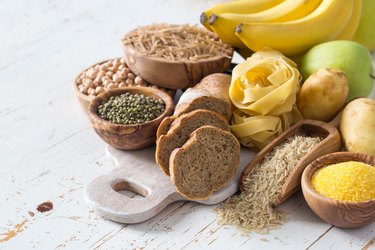
Whether your goal is weight loss, muscle building or getting a better night's sleep, you may wonder about the ideal timing and composition of your meals and snacks. Complex carbohydrates, such as starches and fibrous vegetables, generally take longer to digest than simple carbohydrates, like sweets and fruits, although there are exceptions. Deciding whether to eat complex carbs before bed is primarily a matter of preference, but it helps to know how your choices may affect your weight goals and health.
Tip
Complex carbs are a good source of nutrition and energy, but eating right before bedtime may disrupt your sleep and lead to weight gain if you're eating more calories than your body burns.
Video of the Day
About Complex Carbs
Carbohydrates consisting of three or more sugar molecules qualify as complex carbohydrates. Grains, cereals, starchy vegetables and fibrous vegetables, for example, are complex carbs. However, not all complex carbs are considered healthy choices.
Video of the Day
Refined carbs, such as those found in white flour, for example, are stripped of fiber during the milling process. Additionally, starchy vegetables, such as potatoes, corn and green peas, all affect your blood sugar levels at different rates and to different degrees. According to the Harvard T.H. Chan School of Public Health, the starch in fried potatoes converts to blood sugar almost as quickly as the sugar in candy or soda.
Read more: A Complete Guide to Complex Carbohydrates
Effect on Weight
Although certain complex carbs, such as broccoli, oatmeal and lentils, certainly make healthier choices at any time of day than sugary sodas, desserts and refined grains, eating carbs before bed is not necessarily a recipe for weight gain.
You may have heard that foods you eat right before bed turn to fat, and it's true that any calories not needed to meet immediate energy demands are stored as glycogen or fat. But this is a basic metabolic process that takes place after meals or snacks, regardless of the time of day. Ultimately, the total number of calories you consume and don't burn off — not the calorie source or the timing — determines how much weight you lose or gain.
Effect on Sleep
If you have problems getting to sleep or staying asleep at night, eating your last meal or snack at least two to three hours before bedtime may help. Rather than go to bed hungry, though, eat a snack that includes a complex carbohydrate such as a small serving of oatmeal or yogurt with granola.
Foods that combine complex carbohydrates and protein, such as peanut butter on wheat bread or cereal with skim milk, may even help you sleep. Carbohydrates help deliver the amino acid tryptophan, which has a soporific effect, to your brain, explains the National Sleep Foundation.
Replenishment of Energy Stores
If you follow a rigorous exercise regimen, and particularly if you work out in the evening, you may need to replenish your carbohydrate stores prior to bedtime. Consuming complex carbs can help you restock your glycogen stores, inhibit the breakdown of muscle and assist in muscle recovery.
As for weight concerns, your body is constantly using energy from recently consumed food, storing excess calories as fat and releasing energy from glycogen and fat stores to meet demand. Weight gain or weight loss takes place over days and weeks rather than hours. Consult with your doctor about your food choices and meal timing if you have a diet-related illness such as diabetes.